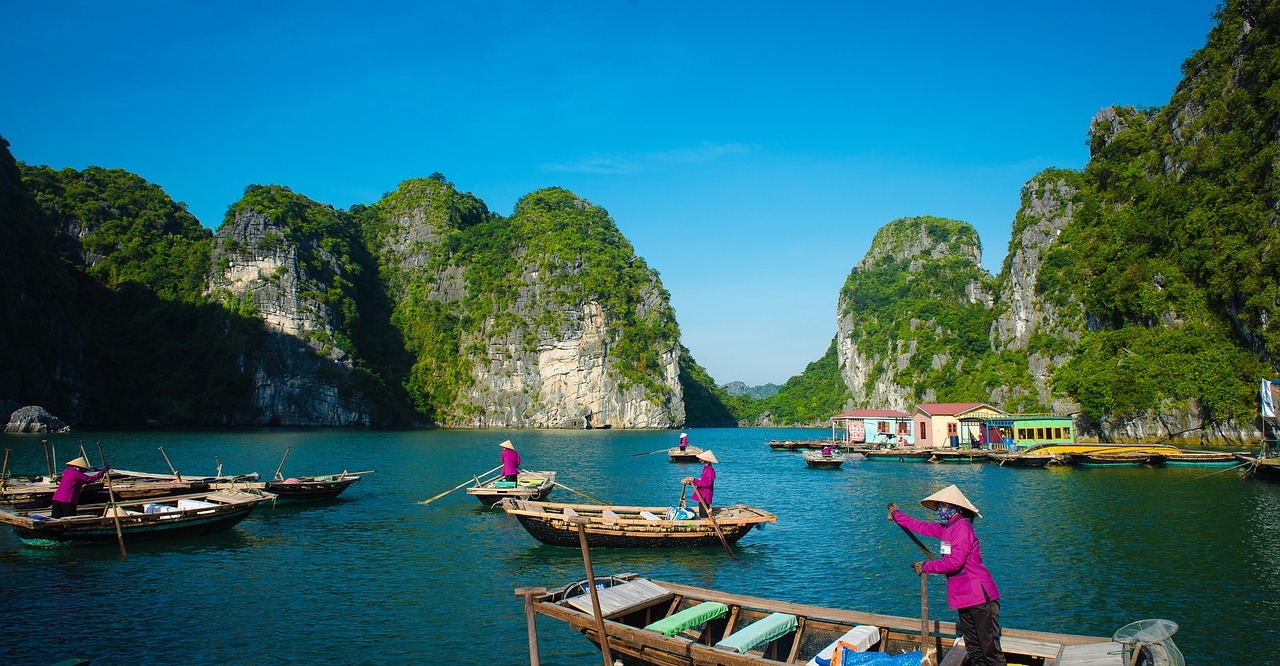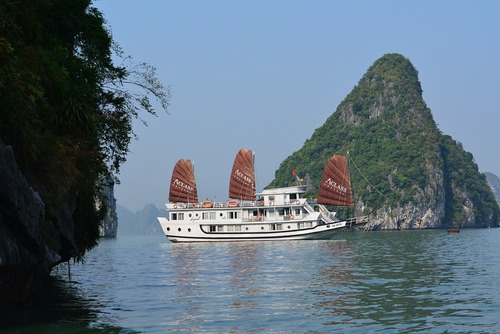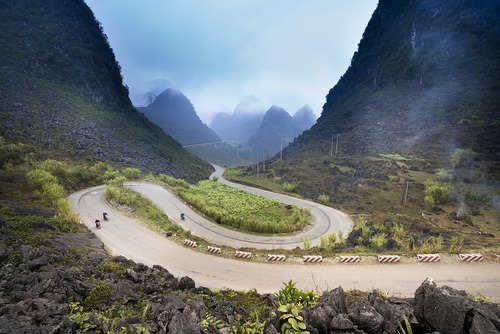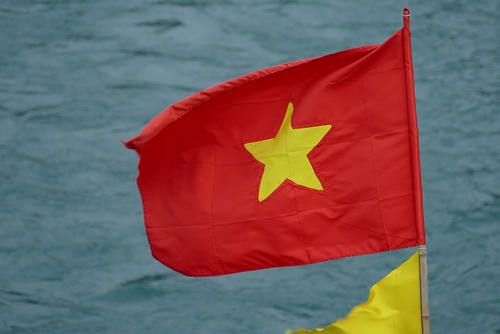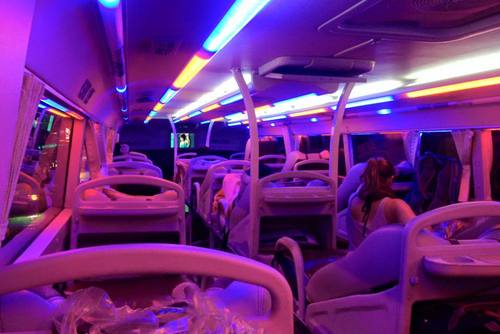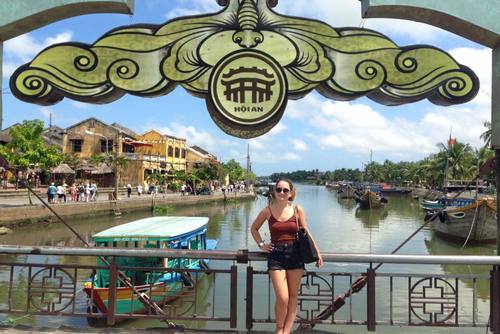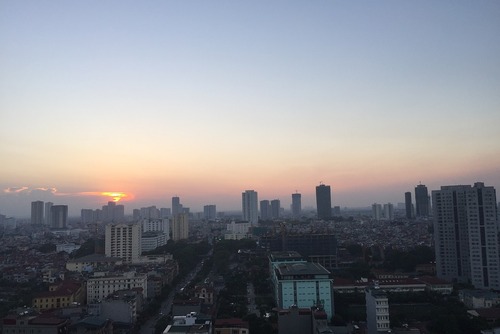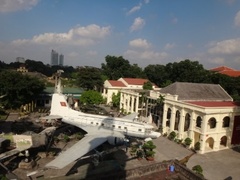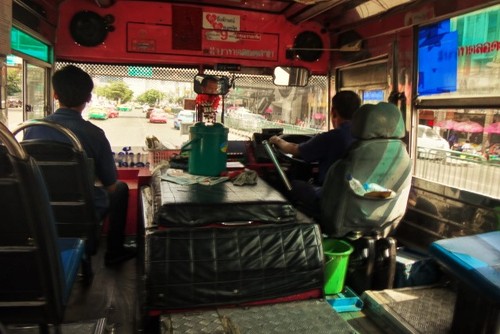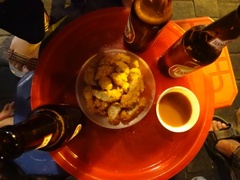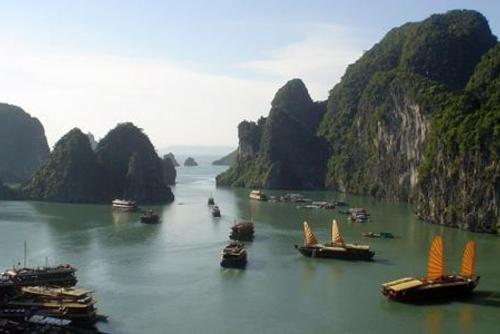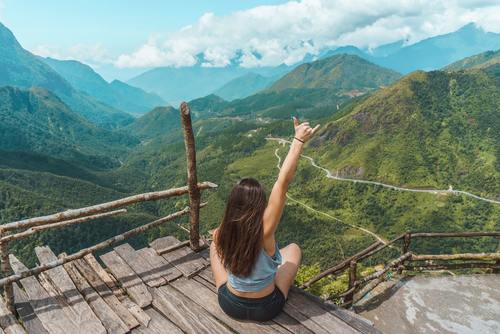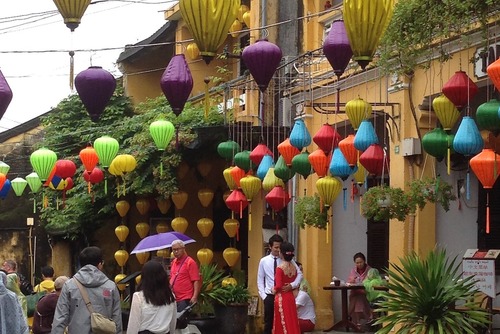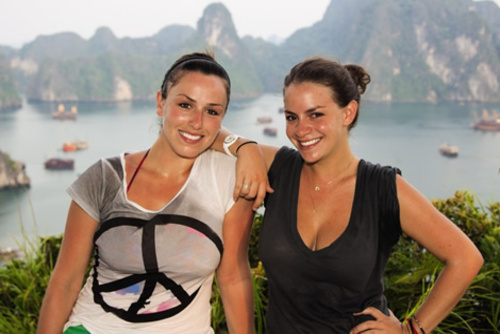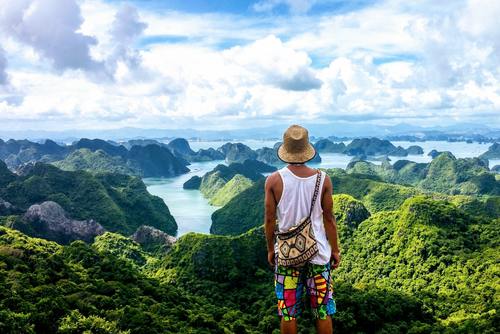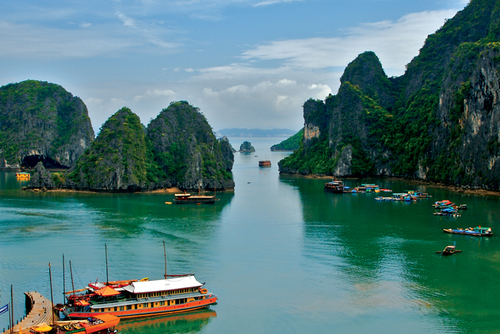Travel to Vietnam
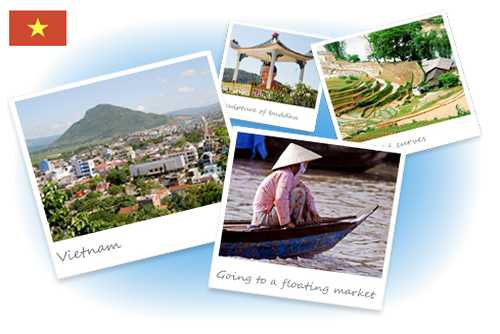
Find travel inspiration for the best things to do if you would like to go travelling or backpacking in Vietnam. Get essential information, tips, itineraries and inspiration
- Capital; Hanoi (population 4,500,000 approx)
- Currency: Dong
- International Calling Code: +66
- Area: 332,000 km2
- Population: 91,000,000 (approx)
- Language: Vietnamese + minority languages
- Religion: Majority Buddhism + others
How to Get to Vietnam
Vietnam is easily accessible from the outside world, you can catch international flights into Ho Chi Minh City and Hanoi. Vietnam is central to the Far East and increasing numbers of airline operators are now offering discount flights from major airports in the region to facilitate travel between countries in the area, allowing you to experience other Asian cultures. International flights can be booked from most major destinations worldwide.
Visa & Entry
If you are from the UK or a selected number of countries you can get a tourist visa on arrival if you are flying into Vietnam and stay for 30 days. By entering Vietnam via land you will need to get a tourist visa prior to arrival, this can be done in the UK or in neighbouring countries. You will need a valid passport and you will have to pay a small fee.
Weather & Best Time to Visit
It is also a good idea to know what the weather will be like when you visit as it is important you choose the right month to suit your travel syle.
Vietnam has a long hot season and also a wet season and deciding when the best time to go can be difficult due to the weather being different in the North and South, and also because it can be quite unpredictable.
Vietnam is busy during peak tourist season around November to March and if you are not a fan of intense heat you might want to avoid this time as temperatures can rise. If a beach break sounds appealing and you are looking for sunny weather in Vietnam we recommend visiting Phu Quoc and Con Dao located in southern Vietnam inbetween November and June.
Or if you would like to visit Nha Trang or Quy Nhon aim to be there around January to September time when you are usually guaranteed sun.
What to Know Before You Go
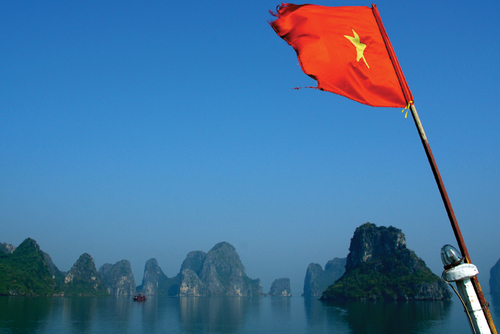
Vietnam has had a well-documented turbulent history, but tourism is going from strength to strength and now millions of people visit annually.
This country is incredible - expect amazing beaches, tasty cuisine, friendly locals and a lot of cultural places to visit and lots of activities and adventures available. There is a different vibe to neighbouring countries and while it's advised that travellers draw up their own list of must visit places and book a tour accordingly, there are a few must-see sights that every visitor should consider.
First stop for most visitors when exploring Vietnam is either Hanoi or Ho Chi Minh City and these are where a lot of tours start. Masses of motorbikes whizz through the streets in their hundreds, and these must be carefully navigated when attempting to make your way from one side of the street to another.
Buses, trucks and cars must also be avoided when crossing the city’s jam-packed streets. There is a real vibrancy and buzz surrounding the Vietnam's cities and visiting it is an opportunity not to be passed up. Trips to the Far East don't usually begin and end in Vietnam, with many travellers heading to nearby countries with an equally fascinating past and you might like to also view all of our Asia tours.
Taking a boat trip to Halong Bay is highly recommended whilst learning to scuba dive in the South China Sea is a thrilling experience. You can visit the war museum in Saigon, see ancient temples or just get lost in the backstreets of Hanoi.
If you are travelling solo or would like to enjoy a fun / safe experience we recommend joining an overland trip to see as much of the country as possible. Na trang has a beautiful beach, visit the War Museum in Saigon, watch out for the moped drivers in Hanoi, do a trek to Sapa and visit the spectacular Ha Long Bay. Don't be afraid to barter for prices especially for clothes in Hoi Ann.
Phu Quoc island is an amazing destination but prices for accommodation are really high, if you are on a budget try to avoid. The sun, sand and surf at Mui Ne make it one of the world’s premier kite surfing destinations. There are qualified instructors on every corner just waiting to teach you all they know, so beginners need not feel nervous – you’ll be in good (and experienced) hands.
The resort itself is worth a few days. Rainfall is negligible, the beaches are some of the best in Vietnam and the nightlife at some of the beach bars could itself be classified as a whole different type of adventure!
Best Things to Do in Vietnam
If you are planning a trip to Vietnam or are keen on the idea of going backpacking these tips from past travellers might help:
- "Eat everything and don't be afraid of street food - go to the non touristy markets. Talk to local people and when you cross the roads walk at a consistent pace because there are no lights so the motorbikes will go around you. You can also hire push bikes to get around, or you can contact local tour guides localted throughout the country. The Mekong is incredible!"
- "It's a beautiful country, and definitely do a tour which include a bike ride! They are the best! There is one tour on the coast from Da Lat to Nah Trang that is worth doing. Book in advance to make sure you get it set up"
- "Nah Trang is great and when you leave be sure to go via Da Lat, they are the opposites of each other. Have fun but be sure to have visa organised before you get to the border , if you don't you will need to go back to an embassy / consulate and wait a couple of days to get one."
- "My favorite places in Vietnam were Dalat, Hoi An, and Sapa! I did a village homestay in Sapa and it's gorgeous up there. Dalat family hostel is a blast and you should go canyoning. And then Hoi An is just an incredible gorgeous little town and it's where a lot of people get custom clothes made."
- "Watch your bag in Saigon in the tourist spots, there's motorbike muggers who snatch your stuff as they drive by"
- "The vietnamese rice wine is amazing, by so are some of their cheap local beers."
- "If you're getting a sleeper train, get bottom berth becuse top it is insanely hot"
- "Nah Trang has a good beach, and there's an awesome theme park called Vin Pearl that you have to go to."
- "Hoi An is a great place to get some clothes made but there's no party life. worth a visit, marble mountain is a short motorbike away"
- "Sapa has Hemp growing in the mountains, don't pick it and forget it in your bag and then realize when you're going through the singapore airport, like I did."
- "Vietnam's crazy traffic is the craziest. There's no break in the city traffic where you can cross, just walk super slowly int othe sea of motorbikes. Be extra careful at night time."
Vietnam Travel Tips
Budget & General Tips:
Vietnam is a cheap destination to travel. It is best to have some VND exchanged before you get to Vietnam because you need to pay for your visa at the airport and you can only pay by cash. During (Tet) which is in either January or February transport and accommodation can be booked up and prices are high during this period.
We recommend using both US dollars and Vietnamese Dong when travelling in Vietnam. Don't exchange money on the border into Vietnam as the rates can be terrible. How much you spend really depends on what level of luxury you are seeking and also what you want to do.
If you are willing to eat in cheap places and stay in budget hotels / hostels you can get by on about £10 ($15) per day. On a mid range budget you can get by on around £20 ($30) per day and if you are seeking the best experience possible you can easily spend over £100 per day ($150).
Accommodation:
An average hotel room in Vietnam costs around £3 ($5) but you can spend more and get air-con, tv, en-suite etc. Accommodation is fairly cheap and there is a lot of choice but it is difficult to find real bargains like you can in other countries in South-East Asia.
To save money you can east street food and eat in local cafes / restaurants if you are on a budget, this will be very inexpensive and also tasty - just be open minded.
Also try to spend or exchange all of your Dong before departing Vietnam as it can be difficult to exchange after, your best bet is find travelling who are heading into Vietnam and might want to change with you.
Getting Around:
Vietnam is very lucky to be based on the ocean and the whole coast is a magnificent to travel and see. There are lots of ways to travel overland via train, car, bus, bike, tour and there is also an extensive railway network which connects the whole country. The main train line runs from North to South making it easy to travel from Hanoi to Ho Chi Minh City.
You can also travel further North from Hanoi and prices vary depending what level of comfort you go for, we recommend going for the sleeper train option with a bed. Public transportation in cities is very cheap, getting around places like Hanoi and Ho Chi Minh City will cost less than £1 ($1).
If you get a local bike taxi agree a price in advance as some drivers will demand a huge sum at the end of the journey. Private transportation through a travel agency as if you go on public tranport they will charge you a lot more than local people and this can work out more expensive than private options. Jetstar also offer cheap flights.
Food:
Don't be afraid to eat local food including street food, this is very very cheap and usually very tasty. Prices for street food might seem cheap but a lot of the times because you are a tourist you will automatically get charged more. With street food there is a lot of choice and so if the vendor won't lower the price move on to the next stall. You can find great value cafes and restaurants throughout the country.
Health & Safety:
The biggest dangers in Vietnam don't come from people, but include crossing roads in the big cities - traffic can be chaos and sometimes it is risky walking in front of cars, bikes and other vehicles. You will need to check what vaccinations are needed at your local healthcare provider before departing, try to visit at least 3 months prior to departure.
We recommend cover for hepatitis A/B, cholera, diphtheria and typhoid. Tuberculosis is an issue in Vietnam with around 600 people dying every year whilst if you are joining programs with animals you might want to get a rabies jab. Malaria is more of an issue in more rural areas of neighbouring countries.
There is only one vaccination needed to enter Vietnam and that is Yellow Fever. You might need to produce proof you have had this vaccination especially if you have entered from a country which is in the Yellow Fever zone.
To stay healthy in Vietnam drink lots of water especially during the hot season when the country is really humid. Take a first aid kit and relevant medication incase of illness, sometimes the local food might not go down well and so diarrhoea tablets are recommended.
Vietnamese people are extremely friendly and are used to seeing tourists. Crime shouldn't be a problem during your stay but don't get into arguments with local people and if you ever feel threatened or intimidated its best to leave the situation. Always speak to other travellers with their recommendations and advice, its always good to get up to date information.
Snatch and grab and petty theft is a small problem in places like Hanoi and Ho Chi Minh City, try not to flash valuables on the street and also be aware of your bags and belongings.

